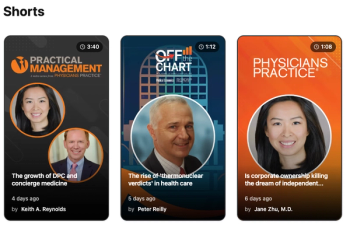
4 Trends that Will Impact Healthcare in 2017
While there is a lot of uncertainty over what will happen in healthcare this year, one expert predicts that value-based care isn't going anywhere.
"Ever since my diagnosis, I sleep just fine. What I came to realize is that fear, that's the worst of it. That's the real enemy." Walter White, Breaking Bad
Uncertainty is abound across healthcare, as the industry grapples with the impact of a Trump administration on the Affordable Care Act (ACA). As a former health system CEO, one thing is crystal clear to me - the pressure on providers to improve quality and reduce costs will only intensify.
The following are trends that will impact healthcare over the next year, and steps providers should take to prepare for their future, regardless of the new 'administration's approach.
#1: Don't Devalue Value-based Care
Some
Provider leaders need to stay the course with value-based models - not only to improve care delivery but, most importantly, it's the right thing to do for patients and communities nationwide. This can be done by:
• Following evidence-based clinical protocols, shown to reduce hospital-acquired conditions and associated costs.
• Leveraging data to engage surgeons on the selection of lower cost, clinically equivalent implantable devices.
• Closer scrutinizing of return on invstment from IT, supply and services contracts, and physician productivity; and reducing layers of management.
#2: Wither or Whither Medicaid?
The future of Medicaid expansion is also in peril - Will it wither on the vine, remain as is, or go in a new direction, and if so, whither?
"Rolling back" Medicaid to pre-ACA laws is problematic, since more than 12 million low-income Americans gained coverage through its expansion. It's also a tough pill to swallow for the 10 Republican governors - or former governors, such as Vice President Mike Pence - who supported expansion.
One option being championed is a "block grant" approach, which would allow the government to give states money based on population and poverty levels to pay for medical needs. Though block grants offer states more flexibility in controlling costs, the
Speculation aside, providers should:
• Strength collaboration with public health entities to identify social issues contributing to avoidable illness and unnecessary care use.
• Bolster advocacy efforts to reassure legislators of their commitment to providing high-value care for all, and insist policymakers keep their obligations.
#3: Breaking Bad –The Looming Consumer Self-pay Crisis
Cancer-related medical bills led TV's Walter White to begin Breaking Bad. This growth in consumer responsibility for healthcare costs has been a reality for some time, and it's getting worse.
The number of high-deductible health plan enrollees has
With medical bills accounting for
As financial responsibility links providers to the credit economy via bad debts owed by families (instead of insurers), providers will need to tighten revenue cycle functions through:
• Better patient communication regarding payment responsibilities.
• Implementing credit quality rating strategies targeting collection efforts where they're likely to yield results.
• Developing manageable payment plans for lower income households.
• Improving coding, documentation, tracking and denied claims management.
• Augmenting clinical IT systems to reduce duplicative documentation.
#4: Piecing Together the Patient Billing Puzzle
Enhancing the patient experience traditionally focuses on quality, care access, clinician bedside manner and facility cleanliness. But another area of frustration for everyone is the medical bill.
Healthcare's back office must to transition from a hospital to hospitality-based approach through enhanced:
• Collaboration with patients to align on expectations and next steps.
• Timeliness and compassion in answering billing questions and resolving issues, including increased payment option flexibility.
• Use of IT to develop clearer bills and mobile-friendly payment options.
Rulon F. Stacey, Ph.D., FACHE currently serves as managing director at Navigant, Chair of the Board of Overseers of the Malcolm Baldrige National Quality Award, and Chair of the International Hospital Federation CEO Circle. A former health system CEO and Chairman of the American College of Healthcare Executives (ACHE), Dr. Stacey was twice named one of the 100 Most Influential People in Healthcare by Modern Healthcare.
Newsletter
Optimize your practice with the Physicians Practice newsletter, offering management pearls, leadership tips, and business strategies tailored for practice administrators and physicians of any specialty.






